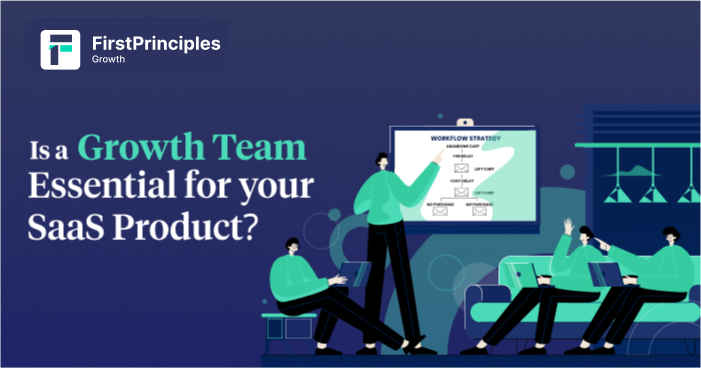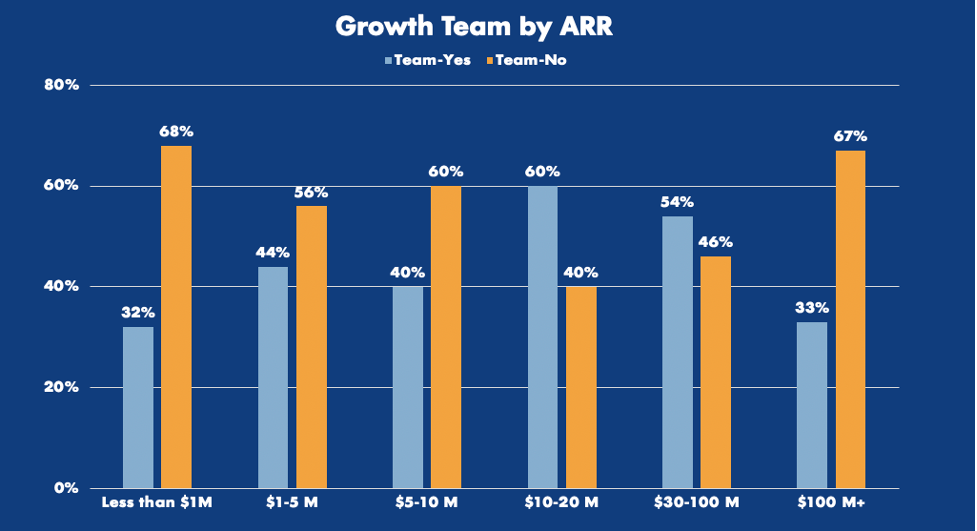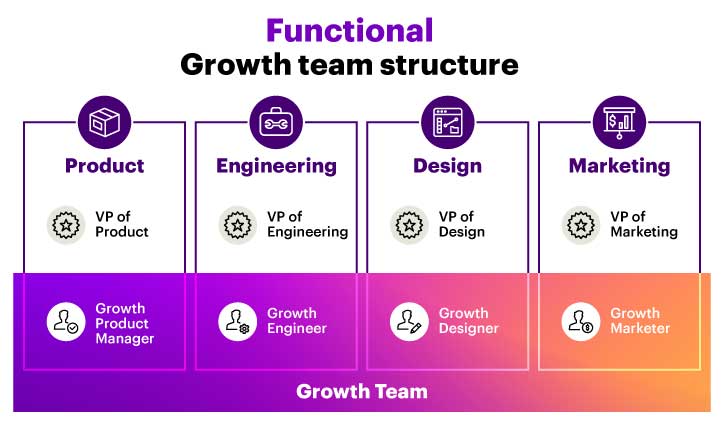
Home > Is a Growth Team Essential For Your SaaS Product?
Table of Contents
ToggleDespite all the talk about SaaS marketing, many companies still struggle to get a handle on their marketing strategy and how to effectively grow their customer base. This is especially true for early-stage startups where execution can feel like a constant game of whack-a-mole. Is it time to hire an outside consultant? What kind of ROI can we expect? How much will that cost?
Software as a Service product has become widely adopted in recent years. It has led to a rise in SaaS startups and the expansion of many into the realm. However, one challenge these new businesses face is scaling their operations.
Scaling involves expanding an organization’s operation so that it can meet increased demand or support more users. A SaaS growth team is an essential cohesive component of any SaaS product business, as they are responsible for increasing the user base, new signups, and revenue.
Depending on your company’s stage, hiring an in-house growth team or outsourcing might be the right decision for you. You might wonder: Is a Growth team essential for your SaaS Product? In this blog, we’ll break it down so you can make the right decision for your company.
A growth team is a specialized team within a company who are responsible for growing the overall number of paying customers. There are diverse roles that make up a growth team, but they all share the goal of helping the product grow.
A SaaS Growth team is a group of employees whose sole responsibility is to drive sustained long-term growth for a SaaS product. These employees typically have deep domain knowledge and experience working on the product and will work closely with product management and the rest of the company’s other departments.
The primary goal of a SaaS Growth team is to ensure the product’s business, and engineering teams are focused on achieving product stretch goals. These stretch goals are quantifiable targets that describe what success looks like for a given feature in the eyes of the company.
The team will help guide product managers in setting stretch goals that are both realistic and achievable. As a result, the team will help alignment across teams, discourage feature creep, and ensure features get tested thoroughly before being released to customers.
They further ensure customer conversions through marketing campaigns and leads and produce high-quality, results-driven marketing campaigns that drive engagement and conversion.
SaaS Growth Marketing teams typically start small, with a few resources, so they can quickly generate impact. They are often under the umbrella of a more traditional marketing function, such as acquisition or demand generation.
Let’s explore why you should build a growth team for your SaaS product and how it can help you grow faster.

[Image Source: TechCrunch]
The SaaS Growth team is responsible for defining and prioritizing growth initiatives and identifying and developing processes and tools to increase user engagement and improve conversion rates. A SaaS Growth team member will typically have a background in marketing or user acquisition, as well as experience in B2B or B2C SaaS companies.
The SaaS Growth team will typically be involved in the following activities:
The role of a B2B SaaS Growth Team is to drive the success of SaaS businesses by increasing their lead generation, conversion, and retention rates. They do this by creating a mixture of SEO, content marketing, and paid advertising campaigns designed to attract high-quality leads and drive them through the sales funnel.
Further, the team is responsible for assessing the company’s current state and setting forth a growth strategy that can be implemented to increase business impact and ROI. The growth team will then work with the team tasked with executing the strategy to execute and optimize it.
SaaS companies are required to grow exponentially to remain competitive and successful in today’s marketplace. At the core, a growth marketing team is a group responsible for bringing in new customers through marketing channels like sales, partner marketing, and, if applicable, product marketing.
The team should be cross-functional, meaning the members should have expertise in marketing, sales, product, and other areas required to grow the business. The role of a SaaS growth marketing team is to drive and plan the acquisition of new customers.
The team is responsible for managing channel partners, sales, and all other marketing activities that lead to growth. There are many ways to create a growth marketing team, such as hiring an in-house or outsourced team.
As your business expands, you’ll likely see a lot of demand for the SaaS growth team role. To succeed, you’ll need to clearly define the role and responsibilities and be ready to hire. Note that you’ll likely want to add other members to the team.
This might include marketers, salespeople, and product managers to help you coordinate and plan your campaigns. To start, clarify the role of the team members. Next, determine how you want to structure hiring for these roles. Is a direct-hire model the best fit for your business? What kind of salaries and benefits should team members receive?
As a company grows, the role of a growth team might change to reflect the organization’s changing needs. For example, your product might require more attention than your sales team at a certain point. In that case, you’d need to hire a growth team focused on product marketing.

[Image Source: Accenture]
Before you can drive better acquisition and sales numbers, it’s important to understand your company’s growth strategy. Once you know where you need to go, hiring an in-house team is the most cost-effective way to get there. It’s also more flexible than hiring an outside agency.
For example, if your SaaS product is mature and your growth strategy revolves around driving more recurring revenue and expanding your base of enterprise customers, you might outsource the sales and marketing work.
The length of their engagement determines the cost of a growth team. As such, hiring an in-house team for six months to a year is likely to be more cost-effective than hiring an outside agency for a longer period.
If you’re a SaaS product company, you’re growing your team as soon as you onboard your first customers. In other words, your growth team is a constant, not just during the launch of your SaaS product but throughout its lifetime.
You want to grow a growth team as soon as you grow your customer base. There’s no point hiring a team if you don’t have customers, right? Start by asking yourself if you’re growing your team in sync with your product growth. For example, you might be growing your sales team, but your product growth is lower than expected. It might be time to re-evaluate your growth strategy.
A growth team is responsible for building and maintaining relationships with qualified leads and prospects and for prospecting and cold calling to generate new leads. The team also works closely with sales to close sales and handle any issues that may arise.
The goal of a B2B SaaS Growth team is to help the business achieve its revenue goals by helping the sales team win more deals, which results in more revenue being generated. Let’s check out some steps that you can take to build a B2B SaaS Growth team:
To build a B2B SaaS Growth team, you first need to do some research into the industry you want to target. You then need to recruit qualified people with the right skills, experience, and attitude to succeed in the role.
A strong, experienced team is crucial for success in SaaS. Make sure to hire people with experience in sales, marketing, and product development.
You also need to provide training and support so that the team can improve its skills and performance over time.
Give the team training on how to sell SaaS play-based products, how to market products through email and social media, and how to implement process improvements.
Ensure that team members feel comfortable discussing challenges with you and each other. It will enable them to take the initiative when problems arise.
Set up healthy and productive competition between teams to encourage collaboration and creativity. Monitor and evaluate the team’s results to make sure it’s performing as expected.
Regularly scheduled meetings allow team members to communicate issues and challenges face-to-face. This creates a sense of teamwork and camaraderie in the office, which is vital for SaaS sales success.
At its core, a growth team is a group of people responsible for driving a company’s growth. The team’s goals are to drive revenue and conversions through improved marketing campaigns and customer service, among other things.
In the best-case scenario, a growth team consists of someone from each major function (i.e., Marketing, Customer Service, Product Development, etc.) who are all on the same page. In reality, however, there is almost never one person who is responsible for all of these functions. Instead, each team member will likely be responsible for one or two specific areas. Here are some of the common roles in a growth team:
There are a few roles that a growth team can ideally fill:
Companies that effectively grow their customer base will experience significant growth in revenue and profit. However, this growth doesn’t happen overnight. It requires time for a company’s growth to ramp up to a pace that will result in a positive impact.
If you can’t see the results you expect from your marketing strategy, it might be time to consider growing your team. A growth team is essential for any growing SaaS company. It can help you grow your business and increase your revenue. Ideally, you should build your team from the inside out.
When hiring for a SaaS growth role, look for candidates who have experience in marketing and have previously managed campaigns. As with most roles, you should have an interview process where you set expectations, challenge what candidates have done in the past, and then make offers to hire the best candidate.
Are you seeking sustainable SaaS growth with a proven framework? FirstPrinciples A+ growth team comprising global experts ensures channeling your MQLs, fuelling up the lead generation process. Hit your target under experts’ envisions! Book your one-on-one session today!
Ameet Mehta‘s expertise lies in building revenue engines for technology-enabled companies and private equity investments. He began his journey with TechStars Chicago and has since founded and acquired several companies through FirstPrinciples Holding Company. The FirstPrinciples portfolio generates over $7M in revenue/year with most companies in the SaaS space. He...